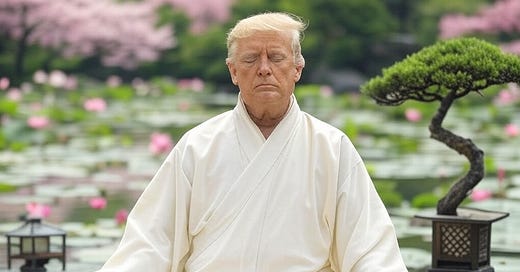Trump in Zen Mode. Wall Street Seems Fine With Post-Globalist West
The regime is in disarray. The market is happy. Creative disruption is where we are at for the time being.
President Trump’s first week has been in Zen mode. He’s whipping through the regime power players and their wandering minstrel bureaucrats and Reddit R/Fednews posters like Yoda fighting with his eyes closed.
We learned yet again that the Uniparty is real and Regime Republicans, the OG Globalists, are going to vote against Trump’s cabinet picks. We are not impressed, nor surprised. The Senate exists to protect the interests of the deep state, the Imperial Capitol itself. The homeland is only interesting to them during election season.
Elections have consequences and at least since 2016 it has been Trump vs The Regime, not Hillary, not Biden. And the regime lost. How the left can like these powers remains a mystery to me other than simple knee-jerk reactions that border on the juvenile.
Trump’s pick Pete Hegseth won his slot as Secretary of Defense only in overtime after Vice President J.D. Vance broke the tie-breaker vote in the Senate. The usual suspects, CIA and defense contractor droids, voted against Hegseth. Maybe it didn’t matter. They made their point. Kept their donors and ideological views pure of heart, knowing a tie would go to Hegseth anyway. Like the great Tom Brady would have said, “A win is a win.”
In Davos this week, Trump told bigshot bankers and oil executives at the World Economic Forum to prepare for tariffs.
JP Morgan’s CEO Jamie Dimon’s not scared. He is the MAGA-Lite that the Murdoch’s want: someone they can count on to be moderately pro-globalist and easily persuaded by the “people with insider information” in defense and intelligence circles in order to maintain Washington’s favorite foreign intrigues.
Dimon said the media and the opposition, a combination of truly useful idiots from the faculty lounge left and the Acela Corridor Galaxy Brain press, along with the men and women who run the regime’s gunboats on Capitol Hill, have to understand Trump has a point in the things he says about mass migration, the economy, and national security. He said, “Trump is a negotiator. He lays out some very tough things and sometimes it works. We have to worry more about national security, resiliency, diversified supply chains, and we didn’t before. And also we should’ve worried more about who it hurt.”
Here, Dimon is talking not only to Wall Street, but to the donor class Dems who wanted Trump to serve a 300 year prison sentence in Rikers Island. Remember those days? To a true cynic, you wonder why he cares so much about helping those in LA County who lost their homes in a fire. Didn’t these people want him dead not too long ago? Well, good for Trump. He’s a better man that most, perhaps.
The market is happy with him, despite promising to basically kill NAFTA 2.0 with 25% tariffs beginning Feb. 1. I’ll believe it when I see it. It’s probably reason No. 3 for Trump’s tariff policy:
Reason No. 1: Raise revenue to lower $2 trillion+ fiscal deficit and afford extending Tax Cut and Jobs Act
Reason No. 2: Reciprocal trade and punishing sectors known for oversupply, mainly in China. This is designed to reshore domestic manufacturing and entice investment in manufacturing.
Reason No. 3: Negotiation tool. Use tariffs to exact concessions from another country. For Mexico, could be paying for border wall, for example. For sure it means full support of Trump’s immigration policies and Mexico getting tough on its cartels.
Tariffs will be used for all of those reasons, depending on country or product.
Brian McCarthy, a former China fund manager at Emerging Sovereign Group in New York, now running research firm Macrolens, gave his subscribers a new word this weekend: Trumptimism.
Trump·ti·mism
noun
1. overflowing confidence about the future based on a non-stop media barrage
touting crypto, AI, and a “business-friendly” environment, echoed by a parade of
tech icons and big bank CEOs.
Example: "The Nasdaq surged to new highs in February on a wave of Trumptimism.”
But it comes with a warning:
“My best guess as to President Trump’s strategy is to boom it to break it – goose the bejeezus out of markets, and hopefully by extension the economy, to pave the way for the tax deal and create a swell of economic momentum which would empower him to then pivot to the more disruptive components of his agenda such as reordering global trade relationships. Of course, there remains some question as to his true motives, and the President’s new-found love for Silicon Valley tech magnates is a feature of his Presidency that did not exist in his first term and would seem to complicate any attempt to pivot to economically disruptive populist imperatives. And the centrality of Elon Musk and his deep financial exposure to China raises serious questions as well,” McCarthy said.
When asked by a reporter this week about inflation, Trump said behind his desk in the Oval Office that interest rates should be coming down. Then the reporter asked him if he made that point to the Fed, would they listen to him. After a pause, he said, side-eyed, “Yeah…”
Lower interest rates is always music to Wall Street’s ears. Maybe thatt is why the S&P 500 had its best first week of any president since the 80s.
For me, it’s still too early to tell how Trump will make do on his promises. Waiting and seeing.
So far, most people I talk to are loving Trump 2.0, with the big critiques reserved for the AI, MRNA program announcements, Trump meme coins, and in a distant third, Elon Musk and DOGE. Trump’s approval rating at Rasmussen is as high as 56%. It’s 53% in mainstream polls that tend to be the ones quoted by the political press.
Recommended reading
Former National Economics Advisor under President George W. Bush Dr. Pippa Malmgren delivers a sharp and provocative take on the start of Trump’s second administration and regime’s forever war machine.
Scrip, Apokálypsis, Ho'oponopono & High Strangeness by Pippa on her Substack.
The shift in the power structure is so profound that many still can’t process what is happening. Confusion reigns. Many disparate events are underway, and the linkages between them are difficult to comprehend. Much of what is happening is so “inside the beltway” and subtle or so technical that even insiders can’t connect the dots between them, let alone outsiders…. It matters that Mike Turner, the fired Chair of the Committee that oversees the CIA and other intel agencies that order these secret operations, has long opposed any transparency on the UAP subject, blocked all amendments on it, and continuously pushed for the amping up of the war in Ukraine. Not only is he backed by Lockheed, Raytheon, and Boeing, but he also has the ground zero of this issue - Wright-Patterson Airbase - in his district. The bottom line here is that the Tier One front-line operators, who are sworn to secrecy, are no longer ok with secrets of such importance being withheld from various Presidents, Congress, and the public. They are no longer ok with forever wars without a clearly defined goal or exit. All this implies that Trump has what Rome had, too – an independent loyal guard who served to protect Rome. A Praetorian Guard. No doubt, there’s going to be a battle between those who think they are protecting America and the Constitution by protecting these secrets and those who think they are protecting America and the Constitution by revealing them. Who is more tightly wrapped in the US flag? This battle may remain entirely invisible to the public.
Wow, Dr. Pippa. That gave me something to think about. (You mean to say, they’re NOT alien ships? I’m still betting on the faked alien invasion to usher in the neo-Bolshevik revolution. Though we are good for the next four years.)
Faculty Lounge
Smarty Pants on the post-globalist West. (Hint, Smarty Pants is pulling from Gary Gerstle’s “The Rise and Fall of the Neoliberal Order”. Almost verbatim. He/Him is doing his best Harvard professor imitation.)
“We are back to trying to force a reorder of the post-World War II Western international order, an order many have said has been corrupted, run by war planners in Washington and Brussels, with the homeland playing second fiddle to the more glamorous subjects of the tropics and frontier markets. For a new political order to take shape, it needs to have the ability to shape the core ideas of political life. Trump is trying to do that early on in going after the humanities-oversupply in government (aka DEI programs) and putting energy transition in check, despite many red states being big on solar and even wind. But for Trump to get people to coalesce around this idea of a post-globalist West, an idea many in Europe are fully on board, he needs supporters across the political spectrum. The New Deal order of FDR sold people on the proposition that a strong, centralized government could avoid Great Depressions and keep people employed. The neo-liberal order persuaded a large majority – from the urban educated classes to small town Americana who were sold regime change wars under the guise of patriotism and ‘support the troops’ – that free trade spread prosperity and ended wars and rumors of wars. Neither of these propositions today could be sold to a majority. They have lost the authority they once had. Political disruption is the order of the day now. If the U.S. is innately the great disruptor, as many of the tech bros who have somehow discovered MAGA, then Trump is in the right place; a true outlier in the Malcolm Gladwell sense. He has put in his 10,000 hours. He is ready for the big time. Four years to steer course towards a post-globalist West won’t be easy. What that looks like and how it comes about is the most important question the U.S. faces.”





